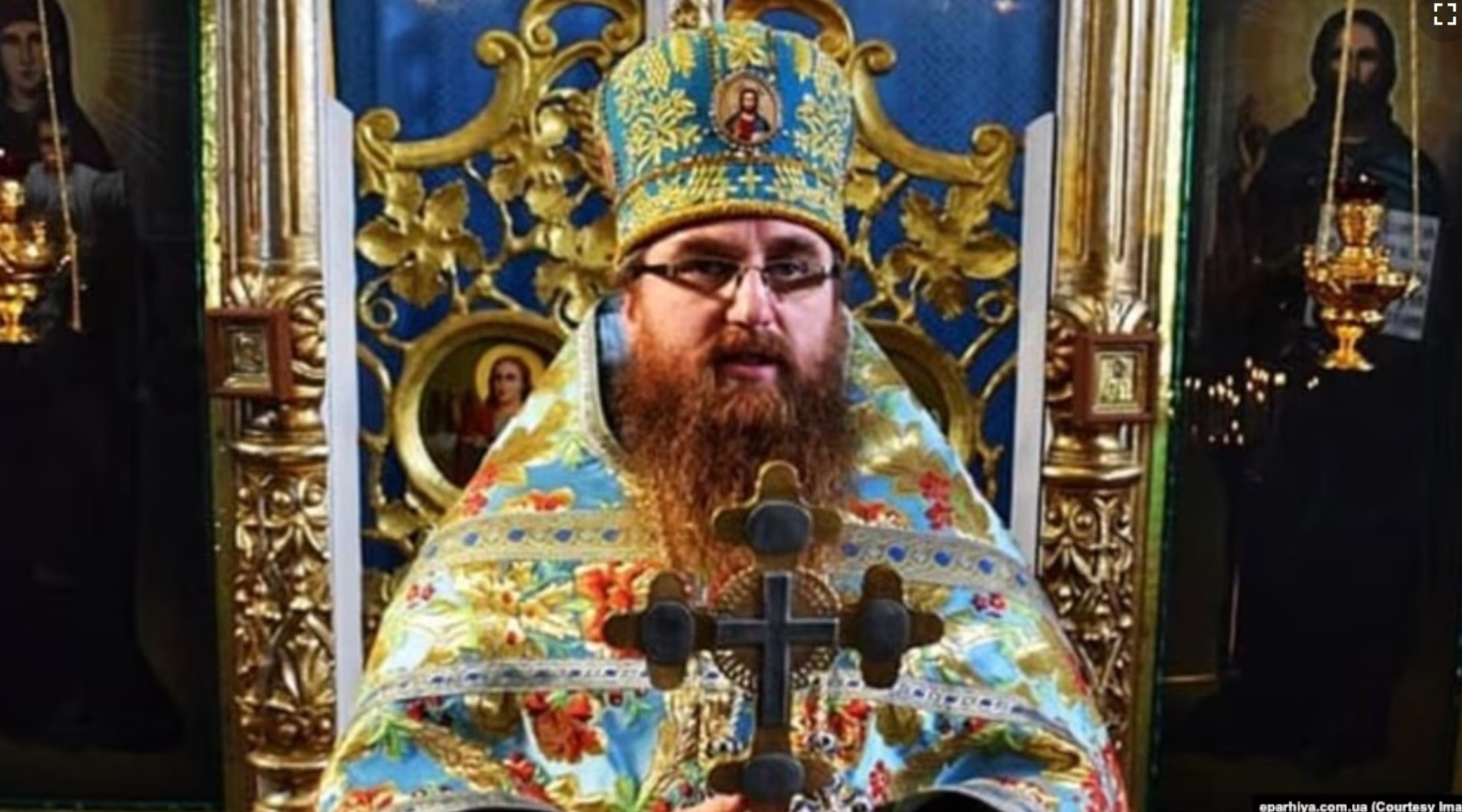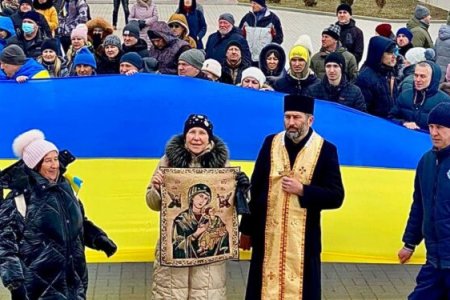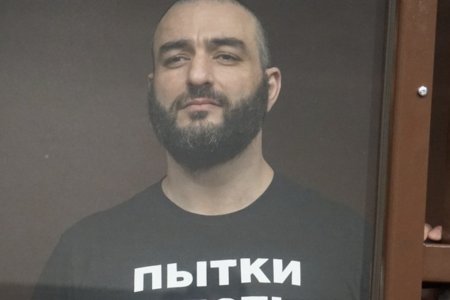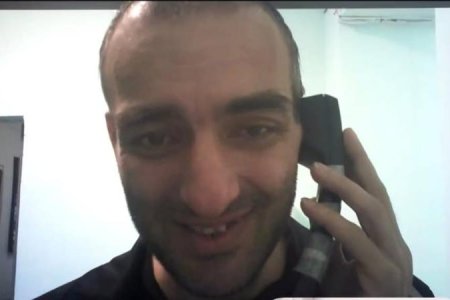
Father Volodymyr Saviyskiy remained in Prymorsk after Russia’s full-scale invasion and seizure of the city. He faced constant harassment, detention and interrogations for continuing to pray for Ukraine and its defenders and for rejecting the Russians’ demand that he report on members of his congregation. He had hoped to greet the Ukrainian Armed Forces when they liberate his city but was forced to leave Prymorsk after the Russians threatened to get him defrocked, and then put him ‘on trial’.
Prymorsk, a small Zaporizhzhia oblast city on the Sea of Azov, has been under Russian occupation since 27 February 2022. Like in the other cities that Russian tanks rolled into, there were daily protests against the invasion, with these continuing until the Russians began openly applying methods of terror and repression. Father Volodymyr was not, himself, subjected to torture, and cannot talk about such practices, but does note that some of those that the Russians detained, did not return. Although, he says, he was flattered that the Russians accused him of been a link for the partisans, he was not involved, and can only hope that there is such a partisan movement, which he clearly wishes every success.
Father Volodymyr was the Head of the Svyato-Mykolsky Cathedral in Prymorsk and is a priest of the Ukrainian Orthodox Church (which is affiliated to the Moscow Patriarchate). He is also Ukrainian and openly continued to pray for Ukraine and its defenders. This clearly angered the invaders, as did Father Volodymyr’s refusal to betray members of his congregation and his country.
Soon after being forced to leave Prymorsk, Father Volodymyr spoke with Current Time journalist and presenter Iryna Romaliyska who is herself from Prymorsk and aware of the terror that Russia has brought to her city. He explained that for a while after the invasion, people came out on protests, carrying the Ukrainian flag. Then, however, the Russians began hunting down pro-Ukrainian activists and also trying to get those with any position or authority in the city to collaborate with them. It may have been Father Volodymyr’s position in a Church traditionally closer to Moscow that stopped the Russians from physically torturing him, but his position in the city also made them intent on getting him to work for them. Like their Soviet KGB predecessors, they wanted Father Volodymyr to report on members of his congregation (who might tell him that their son or husband was serving in the Armed Forces, about opposition activities, etc.). He refused.
He was first detained during Lent. He explains that in the church they had taped a video appeal to Russian president Vladimir Putin, telling him that they did not need to be, as Russia puts it, “liberated”.
During the following months, he says, they continued to pray for Ukraine, for those displaced and refugees. They also continued to help people in any way that they could, and did not take any of the so-called humanitarian aid brought from Russia.
His first arrest, he explains, was on 31 December 2022 when the Russians burst into the church as he was preparing to begin the service. They dragged him from the altar and forced him to strip to the waist in order, he assumes, to check if he had any ‘incriminating’ tattoos, such as a Ukrainian trident. They also carried out a search of his home, taking away his computer, telephones, etc. There was also an interrogation, lasting five hours. They demanded to know why he was not collaborating with the occupation regime., with the fact that he and the others were not taking the ‘humanitarian aid’ angering them, as well as his continued prayers “for Ukraine, for peace, for the displaced and refugees.”
During the next detentions, they said they wanted to know what people are thinking, what they told him during confession. “Of course, I refused to do that, and didn’t write reports on others.”
Romaliyska notes that many of the Russians talk about being in the Church, and asked if they came to Father Volodymyr’s services. His response was biting. He said he cannot understand what kind of ‘religion’ such Russians are talking about when they can burst into a church, disrupt a liturgy and drag the priest from the altar, when they force him to strip to the waist. He does say, however, that in 2023, before [Orthodox] Christmas, some of those who had been mobilized into the Russian army came to the services. They were negative about the war and didn’t understand why they were there, what this war was for, and just wanted to go home.
“Of course, there were also those who came and told me “We’ve come to liberate you” Father Volodymyr was made to endure seven of such “lectures”, he says, and describes one of these.
“Six to eight men in balaclavas, with machine guns, turn up in the courtyard. They take your phone away, sit you down and for several hours tell you that there is no Ukrainian nation, that there is no such language, that “you were made up”, “what the hell are you playing at with your NATO and EU?”, “we liberated you, you should be happy”.
While some of them crawl around the house, in the basement, rummaging through your things, through your books and documents, others sit and read you ‘lectures’ on how great they are. After the ‘referendum’, they asked why I hadn’t taken part in it (incidentally, I don’t know how they knew that I didn’t). They accused me of having a destructive way of life, and claimed that I was disrupting the passport issuing [i.e. foisting of Russian citizenship] in the region, that I was a link for partisans in Prymorsk.”
It got even worse in 2023, he says, with an effective ban on them serving in the Ukrainian Orthodox Church. They wanted priests to only remember the Moscow patriarch in their prayers, and the ‘bishop’ that Moscow had sent, and for them to collaborate with the occupation regime. They demanded that he tell people in church that they should stop opposing them [i.e. the invaders], that they should think differently.
Asked if they had beaten him, Father Volodymyr says that during the first interrogation, lasting five hours, there had been a moment where they threatened “to talk to him in a different way”. When he removed his glasses and said “beat me”, they just laughed, “although they themselves admitted to me that in Kherson they had shaved priests’ heads and had handcuffed them to the bed for five or six days. Physically, they didn’t touch me, but they used a lot of psychological pressure. The seventh such ‘interrogation’ was when I refused to sign their request for transfer to the Russian Orthodox Church”.
Such pressure was also used in occupied Berdiansk, he says, with the Ukrainian Orthodox Church’s Metropolitan Yefrem forced to leave, with the Russians then pushing the idea that the Berdiansk Diocese should change to the Russian church.
“They turned up in the Prymorsk district, gathered up priests and in the presence of the FSB, they read out a thoroughly shameful, really foul letter, claiming that people were happy that the Russian army had come. I spoke out categorically against this, saying that it was betrayal, not only of the Church, but of our Homeland. I refused to sign it.”
A few days later, at around 11 in the evening, a car turned up at his home. The Russian soldiers ordered him to remove his priest’s robe and his cross. He refused to take anything off. They drove him around Prymorsk, trying to force him to accept the so-called ‘decision’ of the Moscow synod that the Berdiansk Diocese had become part of the Russian Orthodox Church.
“I said that I remain a priest of the Ukrainian Orthodox Church. I am a Ukrainian priest and my Metropolitan is Kyiv – his Beatitude Onufriy. I gave my vows on the cross, on the Gospel.”
It was after this, he says, that the persecution really intensified. He left Prymorsk on 1 June after people he spoke with warned him that the Russians wanted to get him defrocked and then be able to not him ‘on trial’ as a layperson. “They would try me for supporting Ukraine, for supposedly stirring up revolted in Prymorsk. I faced 15 years in a Russian prison.”
They had hoped to remain in Prymorsk and be there when the city was liberated, but the Russians effectively forced them out.
There were those in his Church who chose to collaborate, as there are among the population, however he believes that the percentage of those who do not oppose the invasion is still very small. You can see this in the tiny number of people who turn up at any of the festive events that the Russians and collaborators stage.
People began really hoping when Kherson was liberated (on 11 November 2022) “You look at the map and think: Prymorsk is nearby, but you understand that this may cost the lives of hundreds of our soldiers. We hope, pray and wait. People are waiting for the return of the Ukrainian authorities, order and law.”



